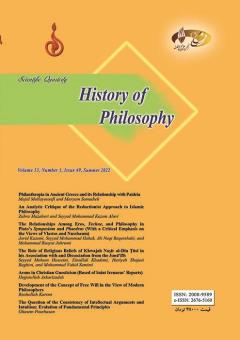Philanthropia in Ancient Greece and its Relationship with Paideia
Subject Areas : New findings regarding the development of ancient western philosophy (Greek and Hellenistic Philosophies)
Majid Mollayousefi
1
,
Maryam Samadieh
2
![]()
1 - Associate Professor, Islamic Philosophy and Wisdom Department, Faculty of Islamic Sciences and Research, Imam Khomeini International University, Qazvin, Iran,
2 - Assistant Professor, Department of Islamic Teachings, Faculty of Human Sciences, University of Maragheh, Maragheh, Iran
Keywords: Philanthropia, philanthropy, Paideia, education, ancient Greece, Plato, Aristotle,
Abstract :
The present paper investigates the relationship between philanthropia and paideia based on the texts of classical Greece. The term “philanthropia” was first used in a play called Prometheus Bound by Aeschylus and was later used repeatedly in some of the literary and philosophical works of the Classical Greece. In this play, philanthropy has been attributed to Prometheus because he stole fire from Zeus to give it to human beings and save them from destruction. In the comedy Peace by Aristophanes, the god Hermes has been introduced as philanthropist because he makes it possible for the humankind to access peace. In Isocrates’ speech, the term philanthropist is applied to political leaders and people who posses the highest level of virtues and share such gifts as knowledge with others. Moreover, in the fourth book of Laws, Plato introduces Cronos a philanthropist because, during his reign, he tried to consolidate the pillars of culture and civilization in society. In the dialogue Euthyphro, Socrates considers himself to be a philanthropist because he shares his knowledge with others. As attested by Aristotle, philanthropia is an essential and intrinsic quality; however, it develops a knowledge-based form through paideia. On the other hand, those existents who are called philanthropists try to develop paideia and spread it in their society.
